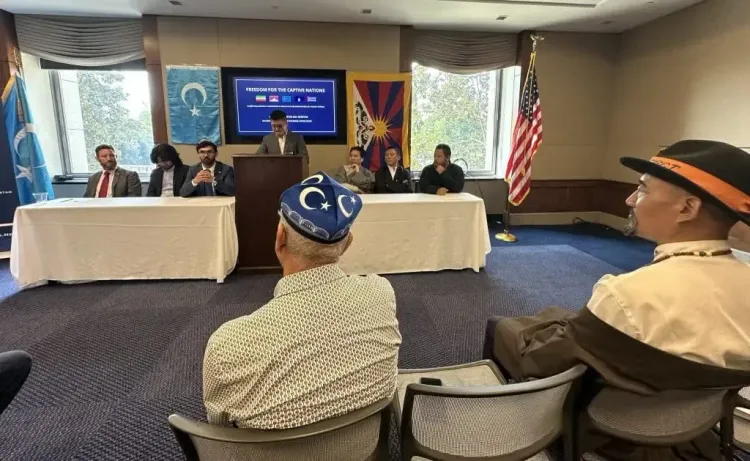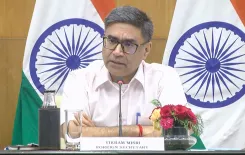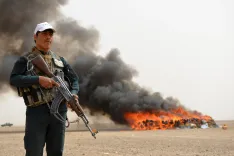What Did the US Congressional Briefing Reveal About the Struggles in East Turkistan, Tibet, and Southern Mongolia?

Synopsis
Key Takeaways
- Turkey's collaboration with Chinese intelligence undermines East Turkistan's independence.
- The CCP's tactics include infiltrating Uyghur organizations abroad.
- Salih Hudayar emphasized the ongoing genocide against Uyghurs.
- Tenzin Wangdue highlighted Tibet's need for concrete action towards independence.
- Se Hoon Kim addressed the systematic erosion of Mongolian identity.
Washington, July 22 (NationPress) During a significant US Congressional Briefing on Captive Nations held in the Rayburn House Office Building, Turkey's cooperation with Chinese intelligence to undermine the independence movement of East Turkistan and the Chinese Communist Party's (CCP) persistent attempts to "divide and co-opt Uyghur organisations abroad" were discussed. The event, which took place on Monday, US time, aimed to honor 'Captive Nations Week 2025'.
The gathering included representatives from East Turkistan, Tibet, Southern Mongolia, US national security experts, and Congressional staff. They came together to shed light on the ongoing occupation, repression, and cultural erasure faced by these communities.
Salih Hudayar, the Minister of Foreign Affairs and Security for the 'East Turkistan Government in Exile', delivered a powerful keynote address, stating, "East Turkistan was explicitly named in the 1959 Captive Nations Resolution, not as part of China, but as a nation subjugated by Communist imperialism. That law remains in force. And tragically, so too does our captivity."
Hudayar highlighted the "ongoing genocide", revealing that millions are detained in concentration camps and prisons, with approximately 25,000 to 50,000 Uyghur and Turkic youth being killed each year and their organs trafficked.
He urged Congress to officially recognize East Turkistan as an "occupied nation", hold hearings on its quest for independence, and investigate the "Chinese infiltration and transnational repression" affecting the East Turkistani/Uyghur diaspora.
Hudayar asserted, "Removing the CCP is not enough. The Chinese empire must be dismantled. The restoration of liberty and independence for East Turkistan is not a dream. It is a duty enshrined in the Captive Nations Resolution."
Established in 1959, the Captive Nations Resolution identifies nations oppressed by communist imperialism, calling for US support to restore their freedom and self-determination. It specifically mentions captive nations like Turkistan and Tibet, advocating for their liberation.
Tenzin Wangdue, a Tibetan-American representative of the Tibetan Rangzen (independence) movement, emphasized the unique identity of Tibet, declaring, "Tibet has never legally been a part of China… Our own government, culture, and identity have thrived for over a thousand years."
He stated, "The Chinese occupation of 1951 was an invasion, not a liberation… The time for empty statements is over. We need concrete action."
Wangdue insisted that only "independence" can guarantee the survival of the Tibetan people.
Se Hoon Kim, a Korean-American journalist advocating for Southern Mongolia, spotlighted the systematic degradation of Mongolian identity, stating, "For decades, the Mongolian people of Southern Mongolia have faced systematic efforts to erode their cultural identity, suppress their language, and marginalize their traditional way of life… What we are witnessing is not merely a crackdown; it is a deliberate assimilation that threatens the survival of an ancient heritage."
Major Ben Loswen (Retd.), a former US Army attache in Beijing, emphasized the global implications of CCP threats, warning, "The attack of the Chinese Communist Party on the United States is proceeding as quickly as the CCP can facilitate and as we will allow."
He urged the US government to prioritize the liberation of captive nations, advocating, "We need to establish an office of East Turkistan affairs… fund the political warfare that the CCP is waging against us."
The briefing concluded with a Joint Statement and Proclamation from representatives of East Turkistan, Tibet, Southern Mongolia, and other oppressed communities, declaring: "The right of all captive nations to recover their independence and exercise national sovereignty is absolute and non-negotiable. We will not cease our efforts until independence is restored, liberty is secured, and justice is achieved for all captive nations."









